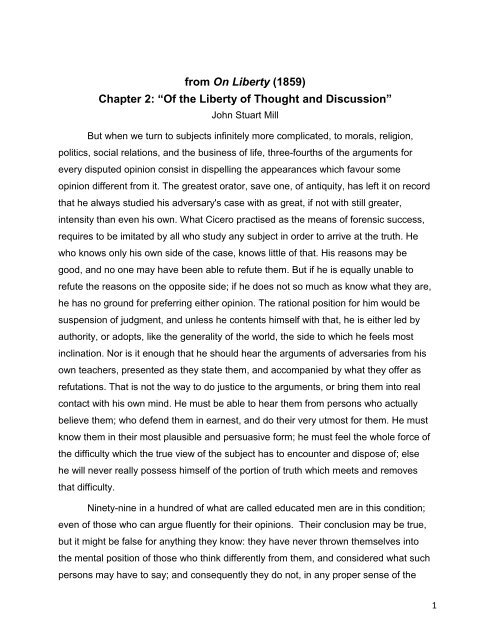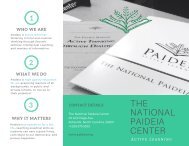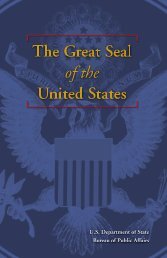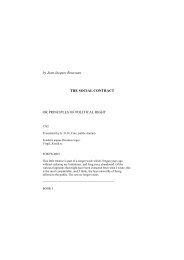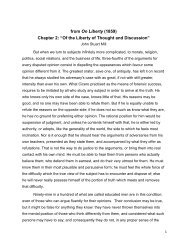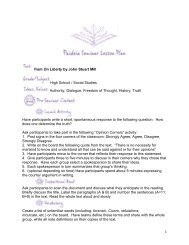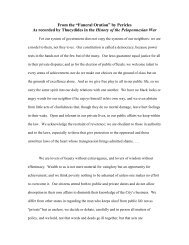On Liberty text (1)
You also want an ePaper? Increase the reach of your titles
YUMPU automatically turns print PDFs into web optimized ePapers that Google loves.
from <strong>On</strong> <strong>Liberty</strong> (1859)<br />
Chapter 2: “Of the <strong>Liberty</strong> of Thought and Discussion”<br />
John Stuart Mill<br />
But when we turn to subjects infinitely more complicated, to morals, religion,<br />
politics, social relations, and the business of life, three-fourths of the arguments for<br />
every disputed opinion consist in dispelling the appearances which favour some<br />
opinion different from it. The greatest orator, save one, of antiquity, has left it on record<br />
that he always studied his adversary's case with as great, if not with still greater,<br />
intensity than even his own. What Cicero practised as the means of forensic success,<br />
requires to be imitated by all who study any subject in order to arrive at the truth. He<br />
who knows only his own side of the case, knows little of that. His reasons may be<br />
good, and no one may have been able to refute them. But if he is equally unable to<br />
refute the reasons on the opposite side; if he does not so much as know what they are,<br />
he has no ground for preferring either opinion. The rational position for him would be<br />
suspension of judgment, and unless he contents himself with that, he is either led by<br />
authority, or adopts, like the generality of the world, the side to which he feels most<br />
inclination. Nor is it enough that he should hear the arguments of adversaries from his<br />
own teachers, presented as they state them, and accompanied by what they offer as<br />
refutations. That is not the way to do justice to the arguments, or bring them into real<br />
contact with his own mind. He must be able to hear them from persons who actually<br />
believe them; who defend them in earnest, and do their very utmost for them. He must<br />
know them in their most plausible and persuasive form; he must feel the whole force of<br />
the difficulty which the true view of the subject has to encounter and dispose of; else<br />
he will never really possess himself of the portion of truth which meets and removes<br />
that difficulty.<br />
Ninety-nine in a hundred of what are called educated men are in this condition;<br />
even of those who can argue fluently for their opinions. Their conclusion may be true,<br />
but it might be false for anything they know: they have never thrown themselves into<br />
the mental position of those who think differently from them, and considered what such<br />
persons may have to say; and consequently they do not, in any proper sense of the<br />
1
word, know the doctrine which they themselves profess. They do not know those parts<br />
of it which explain and justify the remainder; the considerations which show that a fact<br />
which seemingly conflicts with another is reconcilable with it, or that, of two apparently<br />
strong reasons, one and not the other ought to be preferred. All that part of the truth<br />
which turns the scale, and decides the judgment of a completely informed mind, they<br />
are strangers to; nor is it ever really known, but to those who have attended equally<br />
and impartially to both sides, and endeavoured to see the reasons of both in the<br />
strongest light. So essential is this discipline to a real understanding of moral and<br />
human subjects, that if opponents of all important truths do not exist, it is indispensable<br />
to imagine them, and supply them with the strongest arguments which the most skilful<br />
devil's advocate can conjure up. To abate the force of these considerations, an enemy<br />
of free discussion may be supposed to say, that there is no necessity for mankind in<br />
general to know and understand all that can be said against or for their opinions by<br />
philosophers and theologians. That it is not needful for common men to be able to<br />
expose all the misstatements or fallacies of an ingenious opponent. That it is enough if<br />
there is always somebody capable of answering them, so that nothing likely to mislead<br />
uninstructed persons remains unrefuted. That simple minds, having been taught the<br />
obvious grounds of the truths inculcated on them, may trust to authority for the rest,<br />
and being aware that they have neither knowledge nor talent to resolve every difficulty<br />
which can be raised, may repose in the assurance that all those which have been<br />
raised have been or can be answered, by those who are specially trained to the task.<br />
2


